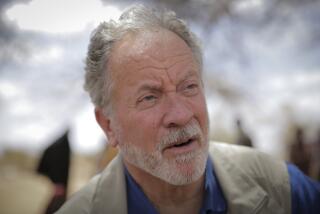‘Skimping in Africa’
- Share via
Thank you for your editorial (Jan. 31), “Skimping in Africa,” reminding us of the critical need for long-term as well as short-term solutions for alleviating starvation in Africa.
It was particularly timely in regard to the impasse in negotiations between the United States and the OPEC nations on the funding of the International Fund for Agricultural Development (IFAD), an impasse that threatens to interrupt IFAD’s operations in providing agricultural loans to small farmers and the landless poor in the world’s poorest regions.
Do not the pictures and stories of those suffering in Africa hearken us back to similar images from Bangladesh in the ‘70s? IFAD has been instrumental in funding projects that have attacked hunger and poverty at its roots in Bangladesh as well as in more than 75 other countries since 1978, with 40% of its activities in Africa.
Today it would cost $400 to ship the equivalent of one ton of wheat to a peasant in the highlands of Ethiopia. For $200 IFAD could enable that same peasant to develop his own food production for a lifetime with loans for tools, implements, seed, irrigation projects, by involving women in the production process, and through small-scale food production projects.
The negotiation impasse (since January, 1984) on IFAD replenishment between the United States and OPEC nations centers on the U.S. refusal to fund more than its current 58% and OPEC’s inability to fund at its previous 42% due to lagging oil profits and its insistence that IFAD’s funding not be reduced. Does our success in reducing OPEC’s stranglehold on the world oil market translate then into cutbacks in loan funding for self-sufficiency for the world’s starving peoples?
On Feb. 28 negotiations will continue. In the balance is a difference of $30 million versus the survival of IFAD with $8 billion in resources and the ability to keep 15 million people alive at a cost of about $2 per person. Of that $30 million, the United States would be asked for an additional contribution of only $5 million over 6 years.
IFAD represents seeds of hope for the poorest of the world’s poor. Will we eat our seeds in a famine of spirit? Or will we plant those seeds for the long term eradication of hunger?
JEANNE SURBER
Altadena
More to Read
Sign up for Essential California
The most important California stories and recommendations in your inbox every morning.
You may occasionally receive promotional content from the Los Angeles Times.













